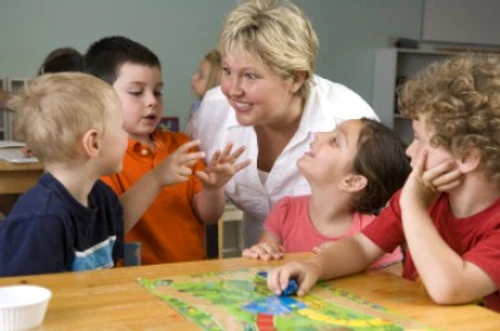
What difficulties do children with autism face when entering kindergartens? Why do educators need special training?
Like any other children, they come to kindergarten with their fears and fears, of separation, of the unknown. In addition, their difficulties in the area of socialization and language do not allow them to express these fears and then strongly inappropriate behaviors can appear, adaptation becomes difficult and they are constantly exposed to the risk of being excluded because the educators do not know how to facilitate their integration .
Among the behaviors that can make it difficult for children with autism to integrate into kindergarten, I now briefly mention communication and language difficulties, lack of interest in socializing, visual contact and attention difficulties, inappropriate, stereotyped behaviors, low frustration tolerance, feeding difficulties and sleep.
What difficulties do educators face, considering these characteristics of children with autism?
Educators face on the one hand the difficulties caused by the child with autism, then with the reactions of the children’s class and on the other hand, with the other parents who sometimes, unfortunately, coalesce against the child with autism. Everyone needs to know how to adapt to this situation, accepting what is different, helping where appropriate, and everyone needs to find their place in this system that belongs equally to everyone involved.
Educators need to understand the limits of the child with autism, but also his resources, to stimulate him to help him properly. Many times, good intentions can lead to negative results when educators do not understand why a child with autism behaves in a certain way and, above all, what can be done to decrease that inappropriate behavior.
Please remind me what autism is and how it manifests itself?
Autism is a developmental disorder that causes the person socialization, communication and language difficulties and behavioral changes, so that people with autism end up processing information differently from others.
Autism is a broad spectrum and can affect the person mildly or severely, starting from the first year of life or around the age of 3, when the child begins to lose the acquisitions acquired until then.
All children with autism have communication and language difficulties, in one way or another, expressed through a poor ability to interact or communicate with others: either they do not speak, or if they do speak they may have difficulties in expressing themselves or in understanding those around them . Difficulties can also be found in non-verbal language – understanding and using gestures, facial expressions, visual contact. In addition, they cannot easily enter into harmonious relationships neither with the mother and the rest of the family, nor with other children of the same age.
Can autism be caused by children’s long exposure to tablets, phones, laptops?
This question is very sensitive and has caused many controversies already. No, autism cannot be caused by exposure to these gadgets. The disorder is present from birth but is of course aggravated by the absence of interaction and the long exposure to these devices.
The child forgotten with the tablet, unstimulated and who has no direct learning experiences develops language disorders, up to its total absence, or the presence of accidental words, without communication purpose (numbers, colors, etc.), without even 3 years not to be able to speak in sentences, to express preference, pleasure, displeasure.
The delay in language development leads to cognitive delays and in the development of social skills, which only develop in direct, affectionate and challenging human relationships for the child. The child who does not learn how to communicate and how to express what he wants will become frustrated, angry and excessively fearful in typical life situations that he does not know how to manage.
We must know that intelligence is a function that develops and can be all the more efficient the more it is trained and stimulated socially and in direct experiences with another person! In addition to the native endowment, the small child is also very interested in any game that could stimulate his abilities and that would help him develop what he has assimilated. The child must be taught to learn, create and explore.
You are involved in many beautiful projects. What motivates you to continue offering these free classes in kindergartens?
This project started almost 10 years ago. This year we go to 10 kindergartens, where on average 200 educators participate and are trained. This means that, over 100 kindergartens in 10 years, and over 2000 educators are better prepared to receive the children.
Of course, it is a project that consumes time and human and financial resources, but someone has to do it and do it well, with consistency. All children must go to kindergarten and school, and be welcomed and supported there as well as possible.
We all know that we need more information and a change in mentality and attitude towards children with autism. I believe that if everyone did their part in this whole process, things would progress faster and more beautifully and the children would have a lot to gain.
This year, I have already been to the Kindergarten Montessori Kids at work, Kindergarten no. 34, Grădiniţa Bambi Step by Step, Grădiniţa 231 and we extended this project in May because we had a lot of requests.
We will continue to meet with the educators from Grădiniţa no. 3, Ciupercuţa and Panseluţa Kindergarten, Kindergarten 168, Harmony Tree Montessori Kindergarten and Dreamland.






































